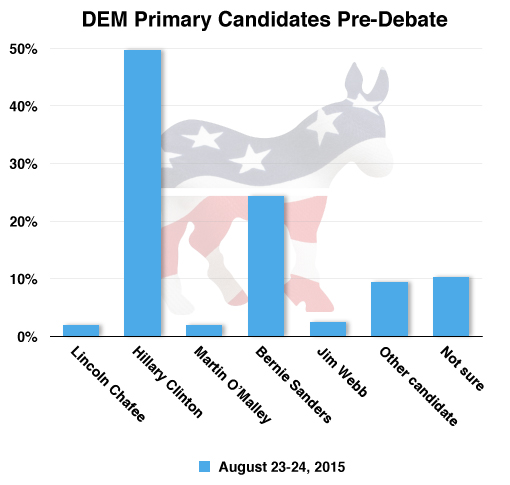Sanders Gains Big As Clinton Falls
Hillary Clinton's numbers continue to fall, while support for Vermont Senator Bernie Sanders has surged significantly in Rasmussen Reports' latest look at the race for the Democratic presidential nomination.
Our latest national telephone survey finds that 50% of Likely Democratic Primary Voters still say they would vote for Clinton if their party's state primary was held today, but that’s down nine points from January and 12 points from last November. Twenty-four percent (24%) now prefer Sanders who had only four percent (4%) support nine months ago.
The remaining announced candidates - former Maryland Governor Martin O’Malley, former Rhode Island Governor Lincoln Chafee and former Virginia Senator Jim Webb - each earn just two percent (2%) of the vote from Democratic primary voters. Ten percent (10%) prefer some other candidate, while another 10% are undecided. (To see survey question wording, click here.)
In the face of increasing legal questions about the safety of secrets on the private e-mail server she used as secretary of State and of the vigorous intraparty challenge from Sanders, belief that Clinton is likely to be next year's Democratic presidential nominee has dropped noticeably over the past month.
Forty-six percent (46%) of all voters - and 24% of Democrats - think Clinton should suspend her campaign for the Democratic presidential nomination until all of the legal questions about her use of the private e-mail server are resolved.
(More below.)
Rasmussen Reports Managing Editor Fran Coombs or spokesman Leon Sculti are available for media comment on these poll results. Call 732-776-9777x205 or send e-mail to leon.sculti@rasmussenreports.com to schedule now.
(Want a free daily e-mail update? If it's in the news, it's in our polls). Rasmussen Reports updates are also available on Twitter or Facebook.
The survey of 536 Likely Democratic Primary Voters was conducted on August 23-24, 2015 by Rasmussen Reports. The margin of sampling error is +/- 4 percentage points with a 95% level of confidence. Field work for all Rasmussen Reports surveys is conducted by Pulse Opinion Research, LLC. See methodology.
Vice President Joe Biden is reportedly moving closer to a decision whether to challenge Clinton for the Democratic nomination because of her e-mail woes. However, Democrats weren’t overly enthusiastic about a Biden run earlier this month.
Massachusetts Senator Elizabeth Warren, a favorite of left-leaning Democrats, has said she does not plan on running for president in 2016. Liberals hope at a minimum that Sanders, a self-proclaimed socialist, will push Clinton’s positions to the political left.
Interestingly, Clinton performs better among liberal Democratic primary voters than moderates. Fifty-seven percent (57%) of liberals support Clinton, while 31% opt for Sanders. Among moderates, Clinton holds a narrower 38% to 25% lead over Sanders.
Roughly half of Democrats of all ages support Clinton in the Democratic race, but Sanders runs strongest among those under 40. Whites like Sanders more than blacks and other minority voters do.
Fifty-three percent (53%) of women and 45% of men support Clinton. More men (28%) than women (22%) opt for Sanders in the primary.
Clinton also dominated the race for the 2008 Democratic presidential nomination in the early going but ultimately lost to Illinois Senator Barack Obama.
Forty-five percent (45%) of all voters - but only 18% of Democrats - now consider the national security questions raised about Clinton’s use of a private e-mail server while serving as secretary of State to be a serious scandal. Twenty-eight percent (28%) of likely voters consider the matter an embarrassing situation, while nearly as many (23%) say it’s no big deal.
As recently as a month ago (and there have been additional questions raised since then), however, 54% felt Clinton’s use of a private, non-government provider for her e-mail while serving as secretary of State raises serious national security concerns.
Just 37% of voters say they trust Clinton.
A survey conducted just after Sanders officially entered the race in late April found that 63% of Likely Democratic Voters said he is unlikely to be the official Democratic candidate next year, while 23% thought he was likely to win the nomination.
Fifty-seven percent (57%) of Likely Republican Voters think Donald Trump is likely to be their party's presidential nominee next year, with 25% who say it's Very Likely.
Additional information from this survey and a full demographic breakdown are available to Platinum Members only.
Please sign up for the Rasmussen Reports daily e-mail update (it’s free) or follow us on Twitter or Facebook. Let us keep you up to date with the latest public opinion news.
The survey of 536 Likely Democratic Primary Voters was conducted on August 23-24, 2015 by Rasmussen Reports. The margin of sampling error is +/- 4 percentage points with a 95% level of confidence. Field work for all Rasmussen Reports surveys is conducted by Pulse Opinion Research, LLC. See methodology.
Rasmussen Reports is a media company specializing in the collection, publication and distribution of public opinion information.
We conduct public opinion polls on a variety of topics to inform our audience on events in the news and other topics of interest. To ensure editorial control and independence, we pay for the polls ourselves and generate revenue through the sale of subscriptions, sponsorships, and advertising. Nightly polling on politics, business and lifestyle topics provides the content to update the Rasmussen Reports web site many times each day. If it's in the news, it's in our polls. Additionally, the data drives a daily update newsletter and various media outlets across the country.
Some information, including the Rasmussen Reports daily Presidential Tracking Poll and commentaries are available for free to the general public. Subscriptions are available for $4.95 a month or 34.95 a year that provide subscribers with exclusive access to more than 20 stories per week on upcoming elections, consumer confidence, and issues that affect us all. For those who are really into the numbers, Platinum Members can review demographic crosstabs and a full history of our data.
To learn more about our methodology, click here.






